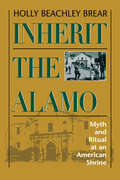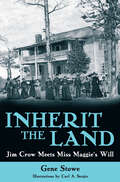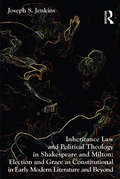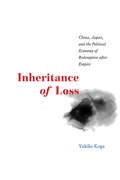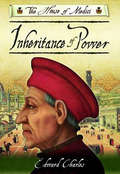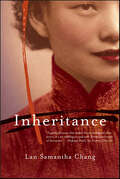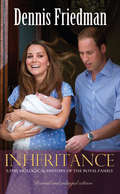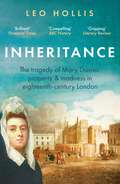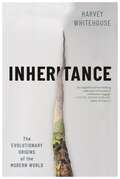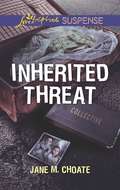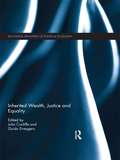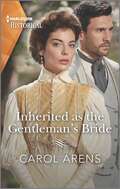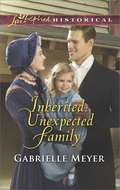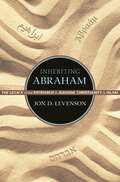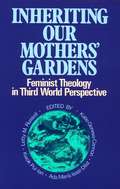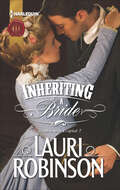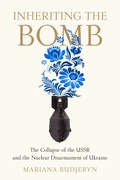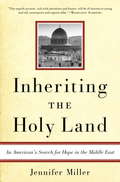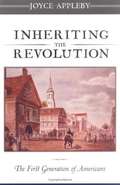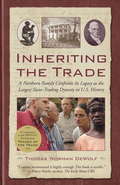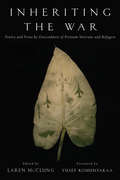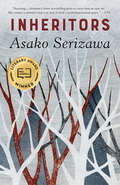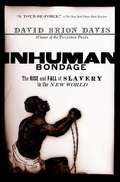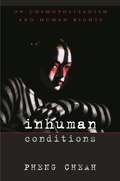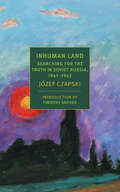- Table View
- List View
Inherit the Alamo: Myth and Ritual at an American Shrine
by Holly Beachley BrearLong overshadowed by the towering buildings of downtown San Antonio, the modest little Alamo still evokes tremendous feeling among Texans and, indeed, many other Americans. For Anglo Texans, the Alamo is the "Cradle of Texas Liberty" and a symbolic confirmation of Manifest Destiny. For Hispanic Texans, however, the Alamo has increasingly become a stolen symbol, its origin as a Spanish mission forgotten, its famous defeat used to exclude Hispanics from an honorable place in Texas history. In this important new book, Holly Beachley Brear explores in fascinating detail what the Alamo means to the numerous groups that lay claim to its heritage. She shows how Alamo myths often diverge from the historical facts—and why. She decodes the agendas of various groups, including the Daughters of the Republic of Texas (who maintain the Alamo buildings and grounds), the Order of the Alamo, the Texas Cavaliers, and LULAC. And she probes attempts by individuals and groups to rewrite the Alamo myth to include more positive roles for themselves, as she explains the value in laying claim to the Alamo’s past. With new perspectives on all the sacred icons of the Alamo and the Fiesta that celebrates (one version of) its history each year, Inherit the Alamo is guaranteed to challenge stereotypes and offer new understanding of the Alamo’s ongoing role in shaping Texas and American history and mythology.It will be of interest to a wide popular and scholarly audience.
Inherit the Land: Jim Crow Meets Miss Maggie's Will
by Gene StoweIn the early twentieth century, two wealthy white sisters, cousins to a North Carolina governor, wrote identical wills that left their substantial homeplace to a black man and his daughter. Maggie Ross, whose sister Sallie died in 1909, was the richest woman in Union County, North Carolina. Upon Maggie's death in 1920, her will bequeathed her estate to Bob Ross—who had grown up in the sisters' household—and his daughter Mittie Bell Houston. Mittie had also grown up with the well-to-do women, who had shown their affection for her by building a house for her and her husband. This house, along with eight hundred acres, hundreds of dollars in cash, and two of the white family's three gold watches went to Bob Ross and Houston. As soon as the contents of the will became known, more than one hundred of Maggie Ross's scandalized cousins sued to break the will, claiming that its bequest to black people proved that Maggie Ross was mentally incompetent. Revealing the details of this case and of the lives of the people involved in it, Gene Stowe presents a story that sheds light on and complicates our understanding of the Jim Crow South. Stowe's account of this famous court battle shows how specific individuals, both white and black, labored against the status quo of white superiority and ultimately won. An evocative portrait of an entire generation's sins, Inherit the Land: Jim Crow Meets Miss Maggie's Will hints at the possibility for color-blind justice in small-town North Carolina.
Inheritance Law and Political Theology in Shakespeare and Milton: Election and Grace as Constitutional in Early Modern Literature and Beyond
by Joseph S. JenkinsReading God's will and a man's Last Will as ideas that reinforce one another, this study shows the relevance of England's early modern crisis, regarding faith in the will of God, to current debates by legal academics on the theory of property and its succession. The increasing power of the dead under law in the US, the UK, and beyond-a concern of recent volumes in law and social sciences-is here addressed through a distinctive approach based on law and humanities. Vividly treating literary and biblical battles of will, the book suggests approaches to legal constitution informed by these dramas and by English legal history. This study investigates correlations between the will of God in Judeo-Christian traditions and the Last Wills of humans, especially dominant males, in cultures where these traditions have developed. It is interdisciplinary, in the sense that it engages with the limits of several fields: it is informed by humanities critical theory, especially Benjaminian historical materialism and Lacanian psychoanalysis, but refrains from detailed theoretical considerations. Dramatic narratives from the Bible, Shakespeare, and Milton are read as suggesting real possibilities for alternative inheritance (i.e., constitutional) regimes. As Jenkins shows, these texts propose ways to alleviate violence, violence both personal and political, through attention to inheritance law.
Inheritance of Loss: China, Japan, and the Political Economy of Redemption after Empire
by Yukiko KogaHow do contemporary generations come to terms with losses inflicted by imperialism, colonialism, and war that took place decades ago? How do descendants of perpetrators and victims establish new relations in today's globalized economy? With Inheritance of Loss, Yukiko Koga approaches these questions through the unique lens of inheritance, focusing on Northeast China, the former site of the Japanese puppet state Manchukuo, where municipal governments now court Japanese as investors and tourists. As China transitions to a market-oriented society, this region is restoring long-neglected colonial-era structures to boost tourism and inviting former colonial industries to create special economic zones, all while inadvertently unearthing chemical weapons abandoned by the Imperial Japanese Army at the end of World War II. Inheritance of Loss chronicles these sites of colonial inheritance--tourist destinations, corporate zones, and mustard gas exposure sites--to illustrate attempts by ordinary Chinese and Japanese to reckon with their shared yet contested pasts. In her explorations of everyday life, Koga directs us to see how the violence and injustice that occurred after the demise of the Japanese Empire compound the losses that later generations must account for, and inevitably inherit.
Inheritance of Power: A Novel (The House of Medici)
by Edward Charles&“Takes a novel angle on Cosimo [de Medici]&’s rise to power by telling the story of his mistress, the Circassian slave Maddalena . . . an incomparable cast.&” —Historical Novel Society Ever-loyal Maddalena, a diminutive, dark-skinned, blue-eyed slave, has borne Cosimo de Medici a son and seen him rise to a position in the Church. Now, late in life, she finds herself committed to a convent, as part of a scheme to prevent Cosimo&’s sons from sending the Medici bank into ruin by hiding a fortune in gold for Cosimo&’s grandson, Lorenzo, to inherit. But as the months go by, and the gold does not appear, her faith in Cosimo begins to wane and with it, her confidence in her own worth. Has she been duped? Approaching old age, she finds in the abbess a confessor, to whom she can confide her true story and perhaps, at the same time, convince herself that her life has been worthwhile. But the abbess has objectives of her own, and the two of them may not be on the same side. Edward Charles presents an enthralling evocation of fifteenth-century Florence in a novel of intrigue, wealth, deception, and high political drama. The largest and most respected financial institution in Europe in its prime, the Medici bank came to represent the might of a family of great influence and power, who scaled the very heights of human grandeur but were to suffer through one of the most catastrophic financial crashes of early banking as the survival of a dynasty hung in the balance. &“A vivid tapestry of Florentine history . . . Imaginatively structured.&” —Booklist (starred review)
Inheritance: A Novel
by Lan Samantha ChangSpanning seven decades and set in China and America against a backdrop of political chaos and social upheaval, this arresting debut novel tells a timeless story of familial devotion undermined by deceit and passion and rebuilt by memory.In 1931, abandoned after their mother's suicide, the young Junan and her sister, Yinan, make a pact never to leave each other. The two girls are inseparable—until Junan enters into an arranged marriage and finds herself falling in love with her soldier husband. When the Japanese invade China, Junan and her husband are separated. Unable to follow him to the wartime capital, Junan makes the fateful decision to send her sister after him. Inheritance traces the echo of betrayal through generations and explores the elusive nature of trust.
Inheritance: A Psychological History of the Royal Family
by Dennis FriedmanIn exploring Royal dynamics, Inheritance sheds light on problems found in any familyOn its first publication in the 1990s, Dennis Friedman's Inheritance caused a furor in England as he traced the many problems of the Royal family as it was then back to Queen Victoria's nursery, unveiling a host of psychodramas played out against a privileged background of English palaces and Scottish castles. In a post-Diana age, the arrival of a new Prince George to the seemingly stable and blissfully happy William and Kate seems to refute Fiedman's thesis--but what of the notoriously wayward Prince Harry? Many questions are raised in this book addressing the complex and turbulent royal relationships, perhaps the most fundamental being the rigid and traditional royal upbringing which still awaits the baby prince. As the royal line is followed down the generations no direct descendent is overlooked and no issue is sidestepped.
Inheritance: A Story of Property, Marriage and Madness
by Leo Hollis&‘Hollis expertly weaves together the human tragedy and high politics behind the explosion of one of the world&’s greatest cities.&’ Dan Snow In June 1701, a young widow, Mary Davies wakes up in a hotel room in Paris and finds a man in her bed. Within hours they are married. Yet three weeks later, Mary fled to London and swore that she had never agreed to the wedding. So begins one of the most intriguing stories of madness, tragic passions and the curse of inheritance. Inheritance charts the forgotten life of Mary Davies, born in London during the Great Plague of 1665, and the land that she inherited as a baby. This estate would determine the course of her tragic life. Hollis restores this history of child brides, mad heiresses, religious controversy and shady dealing. The drama culminated in a court case that determined not just the state of Mary&’s legacy, but the future of London itself. Today, Mary&’s inheritance is some of the most valuable real estate in the world.
Inheritance: The Evolutionary Origins of the Modern World
by Harvey Whitehouse“An insightful and breathtaking exploration of humanity’s evolutionary baggage that explains some of our species’ greatest successes and failures.” —Yuval Noah Harari, author of SapiensThe ancient inheritance that made us who we are—and is now driving us to ruin.Each of us is endowed with an inheritance—a set of evolved biases and cultural tools that shape every facet of our behavior. For countless generations, this inheritance has taken us to ever greater heights: driving the rise of more sophisticated technologies, more organized religions, more expansive empires. But now, for the first time, it’s failing us. We find ourselves hurtling toward a future of unprecedented political polarization, deadlier war, and irreparable environmental destruction.In Inheritance, renowned anthropologist Harvey Whitehouse offers a sweeping account of how our biases have shaped humanity’s past and imperil its future. He argues that three biases—conformism, religiosity, and tribalism—drive human behavior everywhere. Forged by natural selection and harnessed by thousands of years of cultural evolution, these biases catalyzed the greatest transformations in human history, from the birth of agriculture and the arrival of the first kings to the rise and fall of human sacrifice and the creation of multiethnic empires. Taking us deep into modern-day tribes, including terrorist cells and predatory ad agencies, Whitehouse shows how, as we lose the cultural scaffolding that allowed us to manage our biases, the world we’ve built is spiraling out of control.By uncovering how human nature has shaped our collective history, Inheritance unveils a surprising new path to solving our most urgent modern problems. The result is a powerful reappraisal of the human journey, one that transforms our understanding of who we are, and who we could be.
Inherited Threat (Mills And Boon Love Inspired Suspense Ser.)
by Jane M. ChoateHazardous Legacy…Her mother’s mistakes have made her a target.After her estranged mother is killed by a crime syndicate, army ranger Laurel Landry knows she’s next…and she needs help from ex-ranger turned bodyguard Mace Ransom. While Mace is used to doing things his way, their best chance of staying alive is relying on each other. Their enemies aren’t backing down…but together Laurel and Mace might be able to stop them for good.
Inherited Wealth, Justice and Equality (Routledge Frontiers of Political Economy)
by John Cunliffe Guido ErreygersThe core of the book consists of a selection of papers presented at an international workshop where researchers from a variety of fields and countries discussed the connections between inherited wealth, justice and equality. The volume is complemented by a few other papers commissioned by the editors. The contributions cover historical, political, philosophical, sociological and economic aspects.
Inherited as the Gentleman's Bride (The Rivenhall Weddings #1)
by Carol ArensShoutline options:To keep her home…She must marry! When Elizabeth Morsely&’s beloved farm is sold to a genteel London family, she&’s stunned to learn that she&’s part and parcel…as a bride! This country girl believes she&’ll have nothing in common with her city groom, William Grant, except he&’s as reluctant to wed as she is. They agree to a platonic partnership, until Elizabeth glimpses the pure heart behind William&’s aristocratic demeanor. Might their arranged marriage become more after all?From Harlequin Historical: Your romantic escape to the past.The Rivenhall Weddings A brand-new trilogy from Carol ArensBook 1: Inherited as the Gentleman's Bride
Inherited: Unexpected Family
by Gabrielle MeyerAn Unexpected Partnership After arriving in Minnesota Territory with her sisters to claim their late father's hotel, Elizabeth Bell is shocked to learn her inheritance comes with a handsome co-owner. After too long working for a domineering boss, Elizabeth yearns to be in control-of the hotel and her life. But Jude Allen won't sell his share, and Elizabeth refuses to leave. Rescuing soiled doves and giving them hotel jobs is Jude's way of redeeming his past. He's counting on rough frontier life driving his new business partner away before she learns the scandalous truth and demands he stop his mission. But he may have underestimated Elizabeth...and the power of love to turn a complication into a bright new beginning.
Inheriting Abraham: The Legacy of the Patriarch in Judaism, Christianity, and Islam (Library of Jewish Ideas #3)
by Jon D. LevensonHow Judaism, Christianity, and Islam have reimagined Abraham in their own imagesJews, Christians, and Muslims supposedly share a common religious heritage in the patriarch Abraham, and the idea that he should serve only as a source of unity among the three traditions has become widespread in both scholarly and popular circles. But in Inheriting Abraham, Jon Levenson reveals how the increasingly conventional notion of the three equally "Abrahamic" religions derives from a dangerous misunderstanding of key biblical and Qur'anic texts, fails to do full justice to any of the traditions, and is often biased against Judaism in subtle and pernicious ways.
Inheriting Our Mothers' Gardens: Feminist Theology In Third World Perspective
by Katie Geneva Cannon Letty M. Russell Kwok Pui-Lan Ada Maria Isasi-DiazThis book represents a major contribution toward the development of a global feminist theology. The personal histories and experiences of women of African, Asian, Anglo-American, and Latin-American heritage recounted here make it possible to analyze the social and historical contexts of their Christian faith. Their insights into the lives of those who have been oppressed or excluded, in the Third World or in the United States, clear the way for understanding the partnership of men and women everywhere.
Inheriting a Bride
by Lauri RobinsonHe'll get beneath every delicious layer of her disguises...When Kit Becker travels to Nevadaville to find her new guardian, she doesn't count on train robbers stealing her grandfather's will. Determined to track down the thief, Kit's prepared to use any pretense necessary.Clay Hoffman knows a thing or two about money-grabbing females, so when he finds one posing as his new ward he's determined to get beneath every delicious layer of her disguises. Discovering she's telling the truth, Clay is torn-he should be protecting her, not thinking about making her his bride! All he knows for sure is that he's inherited a whole heap of trouble!
Inheriting the Bomb: The Collapse of the USSR and the Nuclear Disarmament of Ukraine (Johns Hopkins Nuclear History and Contemporary Affairs)
by Mariana BudjerynThe collapse of the Soviet Union unleashed the specter of the largest wave of nuclear proliferation in history. Why did Ukraine ultimately choose the path of nuclear disarmament?The collapse of the Soviet Union in 1991 left its nearly 30,000 nuclear weapons spread over the territories of four newly sovereign states: Belarus, Kazakhstan, the Russian Federation, and Ukraine. This collapse cast a shadow of profound ambiguity over the fate of the world's largest arsenal of the deadliest weapons ever created. In Inheriting the Bomb, Mariana Budjeryn reexamines the history of nuclear predicament caused by the Soviet collapse and the subsequent nuclear disarmament of the non-Russian Soviet successor states.Although Belarus and Kazakhstan renounced their claim to Soviet nuclear weapons, Ukraine proved to be a difficult case: with its demand for recognition as a lawful successor state of the USSR, a nuclear superpower, the country became a major proliferation concern. And yet by 1994, Ukraine had acceded to the Treaty on the Non-proliferation of Nuclear Weapons (NPT) as a non-nuclear-weapon state and proceeded to transfer its nuclear warheads to Russia, which emerged as the sole nuclear successor of the USSR. How was this international proliferation crisis averted? Drawing on extensive archival research in the former Soviet Union and the United States, Budjeryn uncovers a fuller and more nuanced narrative of post-Soviet denuclearization. She reconstructs Ukraine's path to nuclear disarmament to understand how its leaders made sense of the nuclear armaments their country inherited. Among the various factors that contributed to Ukraine's nuclear renunciation, including diplomatic pressure from the United States and Russia and domestic economic woes, the NPT stands out as a salient force that provided an international framework for managing the Soviet nuclear collapse.
Inheriting the Holy Land: An American's Search for Hope in the Middle East
by Jennifer MillerWriting with fierce honesty, Jennifer Miller has created an extraordinary synthesis of history, reportage, and coming-of-age memoir in Inheriting the Holy Land. Her groundbreaking perspective on the conflict is presented through interviews with young Israelis and Palestinians and conversations with some of the most influential officials involved in the Middle East, including Shimon Peres, Yasir Arafat, James Baker, Benjamin Netanyahu, Colin Powell, Ehud Barak, and Mahmoud Abbas. This book will open eyes, open hearts, and open minds. Miller grew up in an affluent suburb of Washington, D.C., surrounded by the chaotic politics of the Middle East. Her father was a U.S. State Department negotiator at the Oslo and Camp David peace summits, and dinnertime conversation in the Miller household often included discussions of the Middle Eastern conflict. When Miller joined Seeds of Peace, a program that brings Middle Eastern kids to Maine for intensive sessions of conflict resolution, her real experience with the Middle East began. As she befriended young Palestinians, Israelis, Egyptians, and Jordanians, Jennifer came to realize that their views were missing from the ongoing debate over the Holy Land. By helping these young voices be heard, she knew she could reveal something vitally new and deeply challenging about the future of this torn region. Miller, however, learned fast that it was one thing to hang out at the idyllic Seeds for Peace camp in Maine and quite another to confront young people on their own turf-in the alleys of East Jerusalem, behind the armed gates of West Bank settlements, in the teeming refugee camps of Gaza. Friendships that had blossomed in the United States withered in the aftermath of yet another suicide bombing. Big-hearted teens on both sides of the conflict shocked Miller with the ferocity of their illusions and the twisted logic of their misconceptions. But she also found rays of hope in places where others had reported only despair--surprising open-mindedness among the ultra-religious, common ground shared by those who had lost loved ones to the violence, a yearning for peace amid the rubble of refugee camps and the shards of bombed cities. A deft writer, she interweaves her startlingly candid interviews with the vibrant realities of life in the streets. Just as Jennifer Miller was forced to confront her biases as an American, a Jew, a woman, and a journalist, in Inheriting the Holy Land, she similarly challenges readers to reexamine their own cherished prejudices and assumptions.
Inheriting the Revolution: The First Generation of Americans
by Joyce ApplebyBorn after the Revolution, the first generation of Americans inherited a truly new world - and, with it, the task of working out terms of independence. Anyone who started a business, marketed a new invention, ran for office, formed an association, or wrote for publication was helping to fashion the world's first liberal society. These are the people we encounter in this book, a vibrant tapestry of the lives, callings, decisions, desires, and reflections of those Americans who turned the new abstractions of democracy, the nation, and the free enterprise into contested realities.
Inheriting the Trade: A Northern Family Confronts Its Legacy as the Largest Slave-trading Dynasty in U. S. History
by Thomas DewolfIn 2001, Thomas DeWolf discovered that he was related to the most successful slave-trading family in U.S. history, responsible for transporting at least ten thousand Africans. This is his memoir of the journey in which ten family members retraced their ancestors' steps through the notorious triangle trade route--from New England to West Africa to Cuba--and uncovered the hidden history of New England and the other northern states.
Inheriting the War: Poetry And Prose By Descendants Of Vietnam Veterans And Refugees
by Yusef Komunyakaa Laren McClungDescendants of Vietnam veterans and refugees confront the aftermath of war and, in verse and prose, deliver another kind of war story. Fifty years after the Vietnam War, this anthology by descendants of Vietnam veterans and refugees—American, Vietnamese, Vietnamese Diaspora, Hmong, Australian, and others—confronts war and its aftermath. What emerges is an affecting portrait of the effects of war and family—an intercultural, generational dialogue on silence, memory, landscape, imagination, Agent Orange, displacement, postwar trauma, and the severe realities that are carried home. Including such acclaimed voices as Viet Thanh Nguyen, Karen Russell, Terrance Hayes, Suzan-Lori Parks, Nick Flynn, and Ocean Vuong, Inheriting the War enriches the discourse of the Vietnam War and provides a collective conversation that attempts to transcend the recursion of history. “Each unique work in Inheriting the War embraces a collective that aims to engage through some daring and passionate truths calibrated by bravery.”—Yusef Komunyakaa
Inheritors
by Asako SerizawaFrom the O. Henry Prize-winning author comes a heartbreakingly beautiful and brutal exploration of lives fragmented by the Pacific side of World War II. <P><P>Spanning more than 150 years, and set in multiple locations in colonial and postcolonial Asia and the United States, Inheritors paints a kaleidoscopic portrait of its characters as they grapple with the legacies of loss, imperialism, and war. <P><P>Written from myriad perspectives and in a wide range of styles, each of these interconnected stories is designed to speak to the others, contesting assumptions and illuminating the complicated ways we experience, interpret, and pass on our personal and shared histories. A retired doctor, for example, is forced to confront the horrific moral consequences of his wartime actions. An elderly woman subjects herself to an interview, gradually revealing a fifty-year old murder and its shattering aftermath. And in the last days of a doomed war, a prodigal son who enlisted against his parents' wishes survives the American invasion of his island outpost, only to be asked for a sacrifice more daunting than any he imagined. <P><P>Serizawa's characters walk the line between the devastating realities of war and the banal needs of everyday life as they struggle to reconcile their experiences with the changing world. A breathtaking meditation on suppressed histories and the relationship between history, memory, and storytelling, Inheritors stands in the company of Lisa Ko, Viet Thanh Nguyen, and Min Jin Lee.
Inhuman Bondage: The Rise And Fall Of Slavery In The New World
by David Brion DavisDavid Brion Davis has long been recognized as the leading authority on slavery in the Western World. His books have won every major history award--including the Pulitzer Prize and the National Book Award--and he has been universally praised for his prodigious research, his brilliant analytical skill, and his rich and powerful prose. Now, in Inhuman Bondage , Davis sums up a lifetime of insight in what Stanley L. Engerman calls "a monumental and magisterial book, the essential work on New World slavery for several decades to come." Davis begins with the dramatic Amistad case, which vividly highlights the international character of the Atlantic slave trade and the roles of the American judiciary, the presidency, the media, and of both black and white abolitionists. The heart of the book looks at slavery in the American South, describing black slaveholding planters, the rise of the Cotton Kingdom, the daily life of ordinary slaves, the highly destructive internal, long-distance slave trade, the sexual exploitation of slaves, the emergence of an African-American culture, and much more. But though centered on the United States, the book offers a global perspective spanning four continents. It is the only study of American slavery that reaches back to ancient foundations (discussing the classical and biblical justifications for chattel bondage) and also traces the long evolution of anti-black racism (as in the writings of David Hume and Immanuel Kant, among many others). Equally important, it combines the subjects of slavery and abolitionism as very few books do, and it illuminates the meaning of nineteenth-century slave conspiracies and revolts, with a detailed comparison with 3 major revolts in the British Caribbean. It connects the actual life of slaves with the crucial place of slavery in American politics and stresses that slavery was integral to America's success as a nation--not a marginal enterprise. A definitive history by a writer deeply immersed in the subject, Inhuman Bondage offers a compelling narrative that links together the profits of slavery, the pain of the enslaved, and the legacy of racism. It is the ultimate portrait of the dark side of the American dream. Yet it offers an inspiring example as well--the story of how abolitionists, barely a fringe group in the 1770s, successfully fought, in the space of a hundred years, to defeat one of human history's greatest evils.
Inhuman Conditions: On Cosmopolitanism and Human Rights
by Pheng CheahGlobalization promises to bring people around the world together, to unite them as members of the human community. To such sanguine expectations, Pheng Cheah responds deftly with a sobering account of how the "inhuman" imperatives of capitalism and technology are transforming our understanding of humanity and its prerogatives. Through an examination of debates about cosmopolitanism and human rights, Inhuman Conditions questions key ideas about what it means to be human that underwrite our understanding of globalization. Cheah asks whether the contemporary international division of labor so irreparably compromises and mars global solidarities and our sense of human belonging that we must radically rethink cherished ideas about humankind as the bearer of dignity and freedom or culture as a power of transcendence. Cheah links influential arguments about the new cosmopolitanism drawn from the humanities, the social sciences, and cultural studies to a perceptive examination of the older cosmopolitanism of Kant and Marx, and juxtaposes them with proliferating formations of collective culture to reveal the flaws in claims about the imminent decline of the nation-state and the obsolescence of popular nationalism. Cheah also proposes a radical rethinking of the normative force of human rights in light of how Asian values challenge human rights universalism.
Inhuman Land: Searching for the Truth in Soviet Russia, 1941-1942
by Jozef CzapskiA classic work of reportage about the Katyń Massacre during World War II by a soldier who narrowly escaped the atrocity himself.In 1941, when Germany turned against the USSR, tens of thousands of Poles—men, women, and children who were starving, sickly, and impoverished—were released from Soviet prison camps and allowed to join the Polish Army being formed in the south of Russia. One of the survivors who made the difficult winter journey was the painter and reserve officer Józef Czapski.General Anders, the army’s commander in chief, assigned Czapski the task of receiving the Poles arriving for military training; gathering accounts of what their fates had been; organizing education, culture, and news for the soldiers; and, most important, investigating the disappearance of thousands of missing Polish officers.Blocked at every level by the Soviet authorities, Czapski was unaware that in April 1940 many officers had been shot dead in Katyn forest, a crime for which Soviet Russia never accepted responsibility.Czapski’s account of the years following his release from the camp and the formation of the Polish Army, and its arduous trek through Central Asia and the Middle East to fight on the Italian front offers a stark depiction of Stalin’s Russia at war and of the suffering, stoicism, and bravery of his fellow Poles. A work of clear observation and deep compassion, Inhuman Land is one of the twentieth century’s indispensable acts of literary witness.
